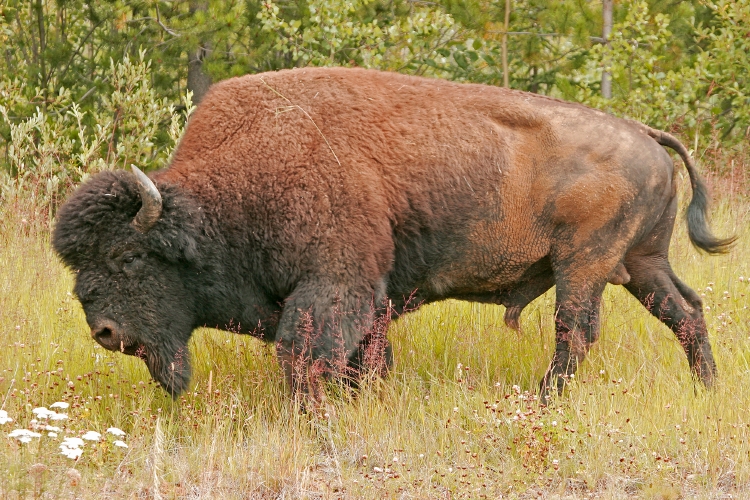|
| 질의: Bison bison bison | 결과: 24번째/289 | |
Wood Bison (Bison bison athabascae) - Wiki
| 제목: | Wood Bison (Bison bison athabascae) - Wiki
| |

| 해상도: 750x500
파일크기: 470283 Bytes
등록시간: 2007:09:23 22:49:04
|
Wood Bison
From Wikipedia, the free encyclopedia
[Photo] A Wood Bison around Coal River, British Columbia. Source (contributed to public domain): http://www.naturespicsonline.com/
The Wood Bison (Bison bison athabascae) or Wood Buffalo is a distinct northern subspecies of the North American Bison whose original range included much of the boreal forest regions of Alaska, Yukon, western Northwest Territories, northeastern British Columbia, northern Alberta, and northwestern Saskatchewan (the words "buffalo" and "bison" are often used interchangeably in popular parlance; however, the technically correct name for this North American bovine is "bison"). It is included on the Threatened species list.
The Wood Bison differs from the Plains Bison (Bison bison bison), the other North American subspecies, in a number of important ways. The Wood Bison is heavier, with large males weighing over 900 kilograms (approximately 2000 lbs), and is the largest terrestrial animal in North America. The highest point of the Wood Bison is well ahead of its front legs, while the Plains Bison's highest point is directly above the front legs.
Reduced by hunting from a total population of about 168,000 to less than 250 individuals by the year 1900, the Wood Bison has since recovered to a total population of approximately 9,000, largely as a result of conservation efforts by Canadian government agencies. In 1988, the Committee on the Status of Endangered Wildlife in Canada (COSEWIC) changed the subspecies' conservation status from "endangered" to "threatened". A subsequent reevaluation by COSEWIC in 2000 confirmed the status of "threatened".
Public free-ranging herds in Alberta, British Columbia, Yukon, and the Northwest Territories comprise the majority of existing Wood Bison, although six smaller public and private captive breeding herds with conservation objectives comprise approximately 10% of the total (n???900). These captive herds and two large free-ranging herds in the Yukon and Northwest Territories, all of which derive from disease-free and morphologically representative founding stock from northern Wood Buffalo National Park, are particularly important for conservation and recovery purposes because the large free-ranging herds in and around Wood Buffalo National Park were infected with bovine brucellosis and tuberculosis when 7,000 Plains Bison (Bison bison bison) were trans-shipped by barge from Buffalo National Park (Wainwright, Alberta) to Wood Buffalo National Park by the federal government during the 1920s. This trans-shipment of plains bison also resulted in the hybridization of all known wood bison (i.e., there are no longer any "genetically pure" wood bison). Both diseases are still present in the free-ranging herds in and around Wood Buffalo National Park; the diseases represent a serious management issue for governments, various local Aboriginal groups, and the cattle industry (which is rapidly encroaching on the Park's boundaries). Disease management strategies and initiatives began in the 1950s, and have yet to result in a reduction of the incidence of either disease despite considerable expenditure and increased public involvement.
Small herds of wood bison are also located in the Alaska Wildlife conservation Center. A private non-profit facility about 45 minutes south of Anchorage, Alaska on the Seward Hwy. (n=15) Also in "Pleistocene Park", Siberia (n=30), as well as in several zoos and private game ranches.
http://en.wikipedia.org/wiki/Wood_Bison
| The text in this page is based on the copyrighted Wikipedia article shown in above URL. It is used under the GNU Free Documentation License. You may redistribute it, verbatim or modified, providing that you comply with the terms of the GFDL. |
|
^o^
동물그림창고 똑똑전화 누리집
^o^
|
|